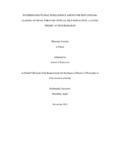
Please use this identifier to cite or link to this item:
https://hdl.handle.net/20.500.14301/26| Title: | Fostering Emotional Intelligence Among The Educational leaders Of Nepal Through Critical Self-reflection: A Living Theory Action Research |
| Authors: | Shrestha, Bhawana |
| Issue Date: | Nov-2022 |
| Publisher: | School of Education |
| School: | SOED |
| Department: | DOEL |
| Level: | Ph.D. |
| Keywords: | Emotional Intelligence Educational leaders |
| Abstract: | This thesis explores the ways in which lived experiences and the emotions anyone feels in combination shapes their leadership journey as an educator. Two forms of analysis are within the scope of my research study. The first is the study of myself and my interpretation of an ideal woman in general, experienced and articulated as a part of growing up in the social and ritual structure of a particular Hindu community. Here I particularly weave my narrative with the emotions associated with motherhood and my mother. The second focuses on the journey that I made together with six other educational leaders working in different educational institutions in Kathmandu, Nepal during the covid-19 pandemic to nurture critical self-reflection among ourselves to foster emotional intelligence in our educational practices. Here, I explain the relationship between the men’s and women’s social roles and how it has gendered emotions and thus leads to disconnection and disharmony within the self and their leadership practices. The theory of transformation and the theory of gender, and the living theory have guided me in this exploration. Emotional Intelligence (EI) cannot be understood and nurtured in isolation from the socio-cultural context. Thus, it is very important to understand how men and women perceive and express emotions and how that perception shapes even their identity as educators. In other words, understanding and expressing emotions are deeply embedded with the values one nourishes, which eventually are part of one's culture. Lack of critical self-reflection leads to emotional illiteracy, leading to disconnection, frustration, and even meaninglessness in professional development. However, it is also an area yet to be explored and nurtured adequately within the existing educational leadership development literature and practices in Nepal. Within the constant debate and skepticism around the globe that sometimes left EI only as a glamorized concept of the West; and, the other times presented critical self-reflection, as a value of the east, the purpose of this (re)search was to (re)visit, (re)read, (re)connect, and (re)imagine a model for critical self-reflection to explore and nurture EI among educational leaders in Nepali context. Active listening, the most important component of EI is what the notion of Shravana in Vedas also signifies; thus I adapted it and blended them and summarized it as LISTEN (!वण) (Listen, Introspect, Share, Try, Express, and Nurture) and used it in my action-reflection process. I explored the eastern Vedic paradigm of reflection wellness paradigm of being and explored the eastern notion of educational process shrawana, manana, and nidhdhyasana. Through them I developed a multiparadigmatic space to foster connections within my inner self and also my educational practices. In my action phase (2020-2021), I did three action projects: Emotional literacy workshops for educational leaders, an Understanding emotional identity workshop, and a critical self-reflection workshop. In the reflection process, I reflected on my living values, examined myself as a living contradiction, and then developed my living theory through two inquiry approaches action research and autoethnography. Methods like discussion, workshop, reflective journaling, observation, and also using art-based genres like narration, poem, metaphors, and painting, were part of my exploration. I found that critical self-reflection helps build emotional vocabulary, which helps the understanding of emotions better, which further helps build empathy and social-relationship. Though these competencies are considered very important to foster EI, they can not be developed without regular practice. Thus another significant aspect of critical self-reflection is the acceptance of vulnerability and a sustainable approach towards it. Therefore building it in the form of habit, which in eastern notion, in the form of dharma is significant. In short, the research explores the living model of critical self-reflection, which I have termed the hexagon of critical-self reflection that focuses on the context. The research concludes that the authentic expression of emotions and empathy is crucial to fostering EI. For that self-awareness is important. For educational leaders to be self-aware, critical self-reflection on their life journey and the journey of their emotional life is important to analyze. The research also highlights that navigating disorienting dilemmas for a transformative experience is not always linear but also a circular process and an interative process that improves consistency in practice. |
| URI: | http://101.251.6.110:8080/handle/20.500.14301/26 |
| Appears in Collections: | Theses |
Files in This Item:
| File | Description | Size | Format | |
|---|---|---|---|---|
| Bhawana Shrestha PhD Thesis updated november 2022.pdf | 14.95 MB | Adobe PDF |  View/Open |
Items in DSpace are protected by copyright, with all rights reserved, unless otherwise indicated.